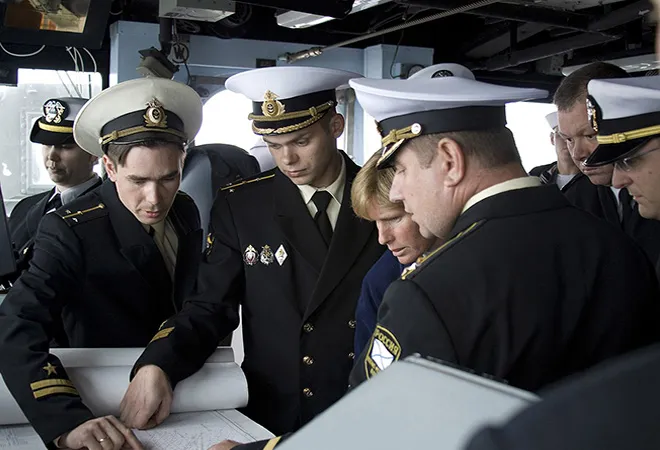As great power competition intensifies in the Indo-Pacific, its impact on the South China Sea (SCS) dispute has been stark, characterised by a more assertive China as well as a renewed focus by the United States on the issue. In addition, ASEAN disunity on the issue has led the Southeast Asian claimants to search for partners to effectively deal with the tensions. Russia — which has sought to strengthen its pivot to the East even as relations with the West have touched a historic low — has refrained from altering its official policy of neutrality on the SCS dispute amid these developments. Not a direct party to the dispute, Russia has sought to carry out a delicate balancing act, especially given that two of its closest partners in the Indo-Pacific — China and Vietnam — are rival claimants in the SCS.
In the 1970s, the Soviet Union sought to strengthen the recently united socialist Vietnam to deal with China, even sending surface vessels and submarines of its Pacific Fleet to the South China Sea during the Sino-Vietnamese border war. However, by the late 1980s, the Soviet Union and China were looking towards a rapprochement and the active support to Vietnam declined, including in relation to territorial disputes. In the post-Cold War period, Russia has maintained that as a non-party to the dispute, it does not intend to interfere in the issue.
The official position
Russia officially maintains a neutral position on the SCS dispute and has argued against interference by outside powers, calling any such moves “detrimental and counterproductive”. Moscow has called for the dispute to be resolved peacefully without the use of force, following the provisions of the 1982 United Nations Convention on the Law of the Sea (UNCLOS). It has supported the Declaration on Conduct of the Parties in the South China Sea (DOC) and called for the adoption of the Code of Conduct at the earliest opportunity. It has also cautioned against “attempts to “internationalise” the dispute as being unhelpful, especially concerning the 2016 ruling of the Permanent Court of Arbitration (PCA) that was decided in favour of the Philippines, rejecting China’s nine-dash line claim.
In the long term, Russia has the potential to become a regional energy supplier as well as provide connectivity via the Arctic Northern Sea Route (instead of via the Straits of Malacca), which could mitigate the contradictions in the SCS. However, this only remains a potential at present, and while Russia’s presence as an independent player is welcomed in the region, its ‘successes’ remain limited due to an overall low level of influence.
Russia came out in support of China in this case, noting that its stance was based on a legal position that any arbitration should involve the parties involved, and since China did not go to the court, it could not recognise the final ruling. This position, while siding with China on the PCA decision, does not express support for its activities in the SCS. This also indicates Russia’s intention not to antagonise the Philippines or other Southeast Asian claimants.
A balancing act
Moscow’s carefully calibrated position on the SCS has been most visible in its close engagement with both Beijing and Hanoi. Vietnam remains its closest economic and defence partner in the region. 84 per cent of its defence imports from 1995 to 2019 were met through Russia; the acquisition of Kilo-class submarines and modern frigates has provided the Southeast Asian nation with a “limited but potent deterrent against China” in the disputed waters. Russia's oil company Rosneft has also carried out joint energy projects with Vietnam’s state energy company within the disputed nine-dash line.
This long-standing partnership has continued to grow, alongside Moscow’s engagement with China that has touched unprecedented levels in the years following the 2014 Ukraine crisis. While there has been concern that Russia is now more willing to openly support China on the dispute, given the decision to conduct a joint maritime exercise in the South China Sea came just two months after the PCA ruling, Russia has sought to allay such concerns. It has argued that the exercises were not conducted in the disputed waters of the South China Sea.
Experts point to another reason for Russia’s active support of China regarding the PCA ruling. In early 2016, there were reports that Ukraine would approach the PCA about a dispute with Russia concerning coastal rights in the Black Sea, the Sea of Azov, and the Kerch Strait (this eventually happened in September 2016). The precedent set by China in not accepting the arbitration ruling could prove useful for Russia in case of an adverse ruling versus Ukraine. At the same time, differences in the SCS with China also persist, with reports in 2020 that Rosneft has had to stop drilling in Vietnam’s EEZ after objections from Beijing; the future of the project remains unclear. While it might seem contradictory to be engaged in close coordination with both sides of a conflict, for Russia it is about more than making a profit from defence sales. These dealings allow it to maintain close relationships with long-standing partners, keeping open an opportunity to act as a facilitator in lowering tensions in case of an outbreak of conflict, prompting Russia to continue its ‘two-track strategy’ in the SCS.
Only one of many players
Russia's relations with other SCS claimants do not garner as much attention as the two aforementioned actors. This can be attributed to limited Russian engagement with these countries, including Taiwan, Malaysia, the Philippines, and Brunei. While Russia remains an arms supplier to countries like Malaysia, has signed a military-technical cooperation agreement in 2017 with the Philippines, and was even invited by President Duterte to explore its EEZ in the SCS, these efforts remain limited in nature. Since multiple middle powers are deeply involved in Southeast Asia, Russia is only one of the many players, and with a significantly lower economic and diplomatic presence as compared to several other stakeholders. There have been efforts in recent years to engage more with countries in the region, but a major shift remains difficult to envisage.
While Russia remains an arms supplier to countries like Malaysia, has signed a military-technical cooperation agreement in 2017 with the Philippines, and was even invited by President Duterte to explore its EEZ in the SCS, these efforts remain limited in nature
In the long term, Russia has the potential to become a regional energy supplier as well as provide connectivity via the Arctic Northern Sea Route (instead of via the Straits of Malacca), which could mitigate the contradictions in the SCS. However, this only remains a potential at present, and while Russia’s presence as an independent player is welcomed in the region, its ‘successes’ remain limited due to an overall low level of influence. Scholars argue that the Russian effort to maintain this delicate balance is a factor both of the rising major power rivalry in the SCS as well as its hedging efforts. In the case of the former, Russia remains an important partner for China but does not openly side with its strategic partner on the dispute. This is because Russia also has its interests in pursuing a multi-vector foreign policy, which includes engagement with other Southeast Asian states in the region. The apprehension that closer engagement with China would affect Russia’s position on the SCS at the expense of Southeast Asian states is yet to be borne out.
With limited regional influence, Russia does not see the benefit in siding with one side over the other and would prefer to continue to act as a neutral party. Amid a heightened US-China rivalry and disunity on ASEAN over the issue, there remains a risk of conflict breaking out, a scenario Russia would like to avoid. It benefits from the status quo, allowing it to improve its regional engagement without explicitly being expected to take sides or negotiate a difficult situation.
This commentary originally appeared in 9dashline.
The views expressed above belong to the author(s). ORF research and analyses now available on Telegram! Click here to access our curated content — blogs, longforms and interviews.




 PREV
PREV


